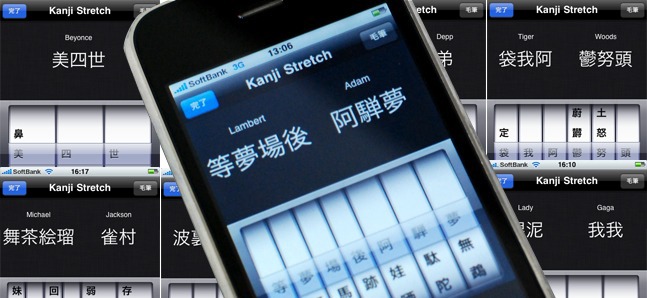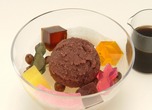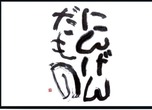
Posted: Mon Apr 12 2010
If you are thinking about taking the 2010 Kanji Kentei (Japanese Kanji Aptitude Test), held on June 20, you still have until May 21 to apply. Over the last few years this already popular test, taken by over 2.5 million people each year, has enjoyed a massive upsurge in popularity – which, in turn, has resulted in somewhat of a test boom in Japan.
Adding more fuel to the fire on the kanji side of this test boom is Munekazu Deguchi’s hit book ‘Yomesou de yomenai machigaiyasui kanji’ (‘Kanji you think you can read but are easy to mistake’), which has now sold over 1.1 million copies.
Kanji are (of course) a part of the language that Japanese people hold dear, however, they are also something that you can interest in without being a native Japanese speaker. Gifts shops in Japan that target foreign tourists often line up a wealth of goods that display kanji (such as kanji T-shirts) which according to Kyoto Handicraft Center (a seven-storey emporium that is particularly popular with foreign tourists and sells all manner of duty-free Japanese gifts and goods) are always popular – especially those that display the kanji for ‘ninja’.
The interest in kanji that non-Japanese often express tends not to be so much about the meaning of the kanji, as more about the various aspects of the kanji, such as the feeling of Japan that kanji convey, and the intrinsic beauty and design of the characters.
From a Japanese person’s perspective, some of the kanji found on the T-shirts and other goods sported by foreigners can occasionally have slightly odd or sometimes even comical meanings. However, like many of the new phonetic kanji compounds that Japanese people themselves coin each year (especially the younger set), no matter how odd or comical a previously unseen kanji word might seem at first, it’s often hard to say whether or not a particular kanji usage is technically wrong.
Drawing on the idea of creating new kanji words, an activity in which both Japanese and non-Japanese alike indulge in from time to time, is a new iPhone app developed by Takafumi Horie (known popularly in Japan as Horiemon), called KanjiStretch.
The idea behind the app is simple: users enter their first and last names in English and the app then displays a list of suitable Japanese kanji characters. After you’ve chosen the characters from the list, the app then displays an image of the kanji name written in a brushed calligraphic typeface, which you can get via email.
For Japanese people, the app could be perceived as overly simple and lacking much real-world use; however, for those who are interested in converting English names into kanji without worrying too much about the meaning of the ‘words’ produced, the app certainly has the potential to provide some entertaining results.
You could, for example, use the app to produce a kanji name that could then be used in any number of ways, such as in a tattoo or on a T-shirt, on business cards, in greeting cards or even as an official Japanese name for either yourself or a child – another option is to simply use the app as a means to have some fun with kanji or as a conversation piece.
Time Out Tokyo spoke with Takafumi Horie to find out more about KanjiStretch and the inspiration behind its creation:

What led you to produce KanjiStretch?
TH: Well, it’s something I’ve wanted to do for a while. I spoke to various people and then by chance, everything came together about six months ago.
Has the iPhone itself, or any particular iPhone apps, had any effect on your own way of life?
TH: ‘Tweetie’ has definitely had an effect. Nowadays, when I’m on the move I’m always looking at my iPhone. Consequently, I have less time to read magazines.
How do you think the world is changing as a result of the iPhone and iPhone apps?
TH: I think that use of the iPhone is accelerating the move towards digital content.
What’s the best way to have fun with KanjiStretch?
TH: I don’t have any tattoos myself, but I think the app could probably help people choose kanji for tattoos.
What’s your favourite kanji character?
TH: The kanji for ‘love’.
Have you had much experience with calligraphy?
TH: I attended Japanese calligraphy classes for four years when I was an elementary school student; I still practice if I get chance.
What do you kind of things do you do for relaxation?
TH: I never relax.
What kind of app are you planning next?
TH: We’re working with our affiliates to produce things such as a tool that will assist users in making multiple blog entries.
Could you share the names of about three apps that you regularly use with us?
TH: Tweetie, AeroReader and Google App.
Interviewed on Jan 21, 2010.
Time Out Tokyo used KanjiStretch to find a kanji name for Time Out. KanjiStretch came up with four kanji characters: the first kanji represents ‘big’ or ‘large’; the second, ‘dream’; the third, ‘cherry’ (with nuances of cherry trees and cherry blossoms); and the fourth ‘city’ – a result that could be summarized as something like ‘a city of cherry blossoms with a big dream’, which, putting aside the silliness of it all, is actually quite an impressive kanji name with some interesting nuances.
KanjiStretch
itunes.apple.com/jp/app/kanjistretch/id347913316?mt=8
Japan-related apps, recommended by Time Out Tokyo
Sumo Techniques (The Kimarite)
An app that introduces kimarite (winning techniques in Sumo wrestling) in English, with illustrations. This is an absolute gem for helping native English speakers understand Sumo. ¥115
itunes.apple.com/jp/app/id347224770?mt=8
Wa Kingyo LE
An app that turns your iPhone or iPod Touch into a goldfish bowl in which two goldfish (one black and the other one white and orange) swim around on top of a Japanese-style decorative background. As well as being visually entertaining, the app also has some fun water sounds that can be activated by touching the screen. ¥115 (free version also available)
itunes.apple.com/jp/app/wa-kingyo-le/id333192368?mt=8
Miso Shiru Reshipi Ichinenbun (One Year of Miso Soup Recipes)
An app that contains a year’s worth of miso soup recipes, Miso Shiru Reshipi Ichinenbun, makes creating this relatively simple, yet difficult to perfect, Japanese soul food (which has almost limitless variations) all together more straight forward. The only downside is that it’s only available in Japanese, but it could be a good chance to practice your kanji reading. ¥230
itunes.apple.com/jp/app/id346422069?mt=8
Tweets
- About Us |
- Work for Time Out |
- Send us info |
- Advertising |
- Mobile edition |
- Terms & Conditions |
- Privacy policy |
- Contact Us
Copyright © 2014 Time Out Tokyo














Add your comment